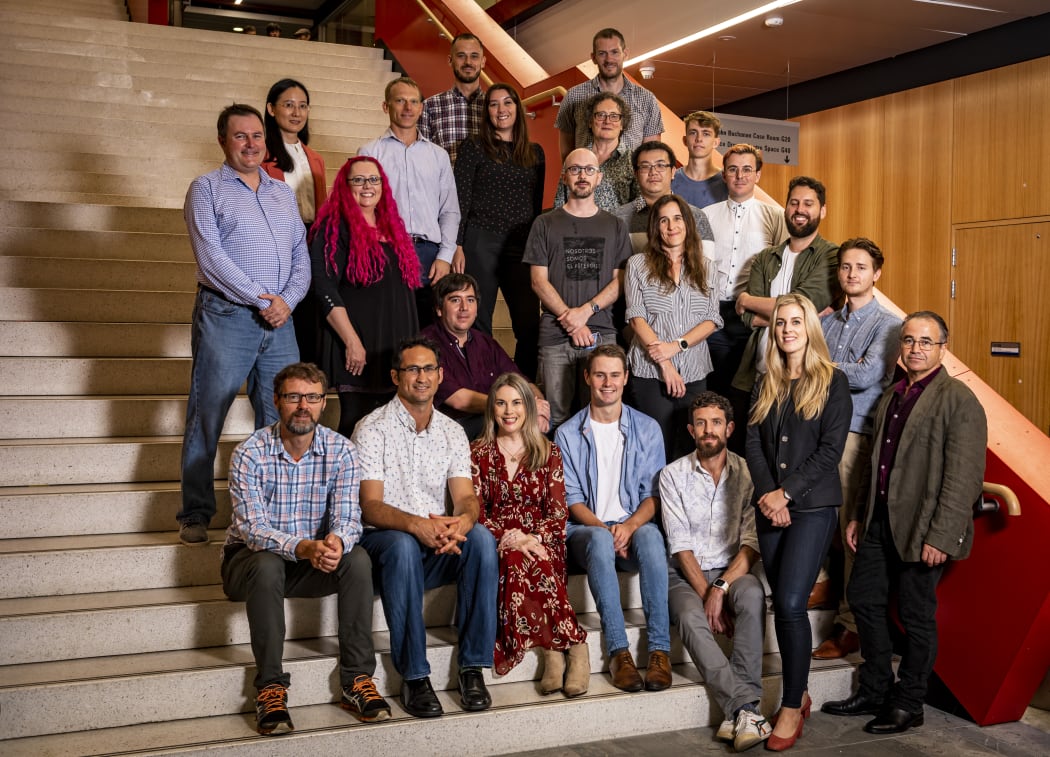There are some familiar faces as well as some new names among the Prime Minister’s Science Prize winners this year.
Two of the five prizes are awarded for efforts to better understand and communicate the Covid-19 pandemic.

A team of 24 researchers working on covid-19 modelling with Te Te Pūnaha Matatini has won the 2020 Prime Minister's Science Prize. Photo: University of Auckland
Follow Our Changing World for free on Apple Podcasts, Spotify, Stitcher, iHeartRADIO, Google Podcasts, RadioPublic or wherever you listen to your podcasts
The five Prime Minister’s Science Prizes are New Zealand’s most valuable research awards. Awarded annually, they are worth nearly $1 million.
A real team effort
The team prize, worth half a million, has been awarded to a consortium of 24 researchers working together in the field of complexity science as part of Te Pūnaha Matatini, a Centre of Research Excellence.
In early 2020, director Shaun Hendy saw that there was a gap in providing the New Zealand Government with the data science it needed to make informed decisions about responding to the Covid-19 pandemic.
He assembled a multi-disciplinary team that developed a series of new mathematical models and ran a multitude of different scenarios to inform the unique situation that New Zealand found itself in.
The team has done modelling work and analysis on a wide number of areas, including hospital capability, contagion rates and likely disease spread, virus genomic tracing, contact tracing, and vaccination.
The results of this work were translated for use by the government policymakers and front-line operators and helped inform the government’s response to the Covid-19 pandemic.
Among other actions, this led to the government’s ‘Go Hard and Go Early’ mantra that resulted in stringent lockdowns - both the country-wide lockdown beginning in March 2020 and the tailored Auckland lockdown beginning in August 2020.
Hendy and University of Auckland colleague Siouxsie Wiles have both been active spokespeople on the subject of Covid-19.
Hendy says the team’s work is not finished yet. He adds "we will be leaving our tools, making them open so they can be maintained in perpetuity, so next time we meet an infectious disease crisis they are there for people to use."

Queenstown technology teacher Sarah Washbrooke has won the 2020 Prime Minister's Science Teacher Prize. Photo: Supplied
Technology a winner in Prime Minister’s Science Teacher Prize
Sarah Washbrooke, from Remarkables Primary School in Queenstown, is the first technology winner of the Prime Minister’s Science Teacher Prize.
She uses a hands-on approach to teaching technology which is so engaging that her students often remain unaware of the depth and range of learning they are doing.
Washbrooke likes to engage her students by offering them real life authentic projects. She also involves the wider Wakatipu community in setting challenges.
Winning research on climate change and ocean acidification

Victoria University of Wellington marine biologist Chris Cornwall has won the 2020 Prime Minister's Emerging Scientist Prize. Photo: Victoria University of Wellington
The 2020 Prime Minister’s Emerging Scientist Prize has gone to marine biologist Chris Cornwall from Victoria University of Wellington.
The focus of his research involves calcifying species such as the familiar pink coralline algae, which is a foundation species for both coral and rocky reefs.
He is also interested in how well pāua and kina will cope as increasing carbon dioxide absorption in the ocean causes water to slowly acidify.
He says that different species respond differently and expects to see a change in the species composition of reefs over the coming decades as some species do well while others decline.
Listen to the podcast to hear modeller Shaun Hendy and disinformation expert Kate Hannah from Te Pūnaha Matatini, marine biologist Chris Cornwall and technology teacher Sarah Washbrooke talk more about their research.

University of Otago epidemiologist Michael Baker has won the 2020 Prime Minister's Science Communication Prize. Photo: Supplied / University of Otago
Talking about Covid-19
University of Otago epidemiologist Michael Baker’s media marathon on the topic of Covid-19 has been recognised with the 2020 Prime Minister’s Science Communication Prize.
Baker says he developed a concept of Covid-19 elimination and concluded that it was the optimal response strategy.
Baker has done more than 2000 interviews since January 2020, contributing more than 30 percent of the total science outputs recorded for the 70 commentators tracked by the Science Media Centre.
He describes the period at the start of March 2020 just before New Zealand went into lockdown as "the most intense period of my working life".

Student James Zingel has won the 2020 Prime Minister's Future Scientist Prize. Photo: Supplied
Testing a quantum computer proves prize-worthy for student
James Zingel, a former student from Bethlehem College in Tauranga, has been selected as the 2020 Prime Minister’s Future Science Prize Winner.
Zingel’s research project used a breast cancer dataset run through both a classical computer and a quantum computer. He wanted to see which is superior in analysing the data and determining the type of breast cancer present.
He found that the classical computer performed better but expects the quantum computer’s ability will improve in future.


